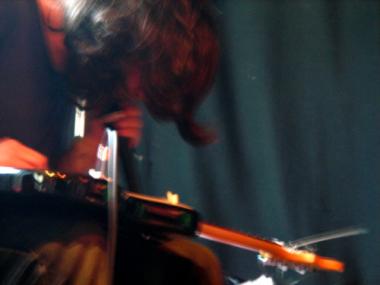Easthampton resident and improvisational guitarist Bill Nace has been in more projects than even he can remember: Vampire Belt, Buddies, Ceylon Mange, x.0.4 and Northampton Wools, to rattle off a few. For over a decade his brand of noisy string-bending and squalling feedback has allowed him to partner on stage or in studio with people as diverse as Sonic Youth guitarist Thurston Moore, current Bjork drummer Chris Corsano and legendary saxophonist Paul Flaherty.
In the process, along with his Open Mouth CDR/cassette/7-inch imprint, Nace has helped put Western Massachusetts on the map in the improv/noise/free music universe. Nace sat down to talk shop before a recent night of performing at the Jones Library in Amherst.
Advocate: Who influenced you musically?
Nace: Early on, I would say Unwound, Sonic Youth. But I also heard my first noise record at 18, along with Interstellar Space by John Coltrane. That was a pretty big eye-opener. There are so many—I wouldn't want to leave anyone out. Sometimes you look at what you don't want to do. Sometimes you try and recreate an industrial sound, or hear a noise in nature you want to replicate.
Your music has been reviewed as "string abuse," "obliterating" and "total annihilation."
I guess some of it has harshness to it, but I think those terms sound really destructive and confrontational. That's not where I'm coming from. People have different responses to the noise. To some, it is reminiscent of industrial sounds, but I also see them as sounds of nature.
Tell me about the current state of the noise scene.
Back in 1999, no bands came here. For music I'm interested in, improvisation and noise, performers come here now. With Flywheel, the colleges and people like [Thurston Moore's record label] Ecstatic Peace, Western Massachusetts has become part of the international network.
Why have you ended up with so many projects and collaborations?
This sounds simplistic, but if you think of talking to someone, you get something different from each person you talk to. There's a danger of getting too comfortable with the same people, improvising in the same way with repeated performances. Playing with a lot of different people allows you to continually find a new context for yourself.



